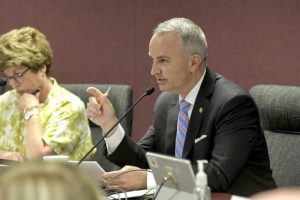Bills on charter school funding, open school enrollment sent to Missouri Senate
(The Center Square) – Increasing charter school funding and allowing open enrollment in public schools came closer to becoming law in Missouri as the House of Representatives passed and sent two…

(The Center Square) – Increasing charter school funding and allowing open enrollment in public schools came closer to becoming law in Missouri as the House of Representatives passed and sent two bills on the subjects to the Senate
House Bill 1552, sponsored by Rep. Doug Richey, R-Excelsior Springs, would require school districts to pay for each student attending a charter school in that district. It passed 85-67.
House Bill 1814, sponsored by Rep. Brad Pollitt, R-Sedalia, would allow any student enrolled in a public school district to attend a public school in a district where they don’t reside. It passed 85-66.
Supporters of charter schools stated the bill provides equity and corrects a flaw in the funding formula. The bill would also ensure students in public and charter schools be treated the same and have access to the same services.
“I think the upwards of 11,000 students in St. Louis charter schools are an important population for us to keep in mind,” Richey said on the House floor before the vote. “The vast majority of those students are minority students. Many of those are special education students and we need to make sure they are properly funded.”
One area of compromise in the charter funding bill is a delayed effective date of July 1, 2028, for all metropolitan school districts. Rep. Kevin Windham, D-Hillsdale, argued against the bill and questioned the motives as he urged House members to consider the future of education.
“Call me vain, but I think the purpose the whole time is to expand charter schools into St. Louis County,” said Windham, whose district includes the Normandy School Collaborative under state control. “Today, if it’s my school district in St. Louis County, tomorrow it could be yours.”
Politt, a former teacher, principal and superintendent, said work on the open enrollment concept during the past two years spurred many phone calls and conversations.
“Education reform is hard,” Pollitt said. “It’s emotional. It’s scary. A lot of things have been said about this bill, but there’s 40-plus states with open enrollment and they still have public education.”
Rep. Maggie Nurrenbern, D-Kansas City, opposed the bill due to concerns about schools not enrolling some students with individual education plans and transportation costs.
“I also oppose this bill because I see this leading to an extreme pitting of school districts against each other,” Nurrenbern said on the floor. “What we need in schools today is collaboration. What we need in schools today is a spirit of bringing everybody to a higher place than we are today.”
Windham said he could envision voting for the bill if it was more comprehensive in addressing school performance.
“I wish we could work toward some proactive measures that treat the disease rather than the symptoms,” Windham said before the vote. “Things like more funding, rather than shuffling around the students… Hopefully we can get to the bottom of this, solve issues rather than putting Band-Aids on issues.”
Pollitt told the House to focus on the children when they cast their vote.
“I ask for everyone to give serious consideration in giving parents a choice,” Pollitt said. “Give the option for them to go to a school district that can better meet their family’s needs, but more importantly the needs of our children. When all is said and done, education is about the child and the parents need to be involved in that.”
The Senate referred Pollitt’s bill to its Education Committee on Thursday.



